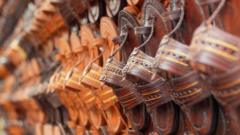Local artisans from Kolhapur are voicing their grievances against Prada for allegedly copying their traditional sandal designs without acknowledgment, reigniting discussions on the protection of cultural heritage and artisan rights in the global fashion industry.
Kolhapur Artisans Protest Against Prada's Design Appropriation

Kolhapur Artisans Protest Against Prada's Design Appropriation
Artisans in Kolhapur, India, express outrage over Prada's mimicking of their traditional sandal designs, sparking a debate on cultural appropriation and artisans' rights.
The town of Kolhapur, Maharashtra, is at the center of a tumultuous discussion about cultural appropriation as local artisans unite against the high-end fashion brand Prada. This collective outrage comes after Prada unveiled a new footwear line during Milan Fashion Week that closely resembles the traditional Kolhapuri sandals—an artisan product with roots tracing back to the 12th century.
Craftsman Sadashiv Sanake, aged 58, demonstrates the labor-intensive process involved in creating these sandals in his modest workshop, where he typically produces a mere eight to ten pairs a day for prices ranging between $8 to $10. With only about 5,000 artisans in Kolhapur dedicated to this craft, many struggle to survive in an increasingly mechanized industry plagued by poor working conditions and meager wages.
The unveiling of Prada's similar designs—without any reference to their origins—set off a storm of outrage on social media, leading to swift acknowledgment from the luxury label regarding the sandals' cultural roots. Local politicians and industry groups have rallied behind the artisans, pushing for improved recognition of their craft and its cultural significance. Mr. Sanake, unaware of the luxury brand's appropriation until informed by a BBC reporter, expressed disbelief at the potential retail prices for Prada's versions, questioning if they contained gold.
While Prada hasn't disclosed exact prices for the new line, the brand's other footwear items typically retail in the UK for between £600 to £1,000. The history of these sandals highlights their cultural and economic importance, as they were originally made by the marginalized Charmakar community, supported in the early 20th century by royal patronage that allowed the craft to thrive.
However, despite the rising number of artisans across India engaged in this trade, generating approximately $200 million, they remain largely unprotected and often poorly compensated. Sunita Satpute, a 60-year-old artisan earning $4 to $5 daily, described the struggles facing women in this industry, particularly those able to engrave intricate designs by hand, as they work under harsh conditions with little or no recognition.
Rising costs of materials, such as leather—previously sourced from cowhide but now increasingly reliant on buffalo leather due to government regulations—have further strained artisans financially amid competition from synthetic alternatives flooding the market.
This outcry over Prada’s interpretations has highlighted longstanding issues regarding artisan rights, and calls for better institutional frameworks to protect indigenous crafts are echoing within the community. While India awarded Kolhapuri sandals Geographical Indication (GI) status in 2019, it lacks sufficient global protection against imitation.
Legal advocates suggest India leverage its position internationally to protect its artisanal heritage, but many note that the path to effective change is intricate and often costly. Moreover, industry leaders like Lalit Gandhi from the Maharashtra Chamber of Commerce, Industry & Agriculture (MCCIA) are actively seeking to protect the Kolhapuri sandal design through formal patents.
Notably, this is not the first instance of global brands facing accusations for appropriating Indian craftsmanship, as many have drawn inspiration from Indian textiles and techniques without engaging local artisans. Gandhi acknowledges that while Prada's brewing controversy may elevate interest in Kolhapuri sandals, securing a share of profits for the artisans is crucial. Already, sandal seller Rohit Balkrishna Gavali notes an uptick in clientele from overseas regions due to heightened awareness.
Compellingly, a legal plea has emerged in high court demanding not only financial compensation for the artisans but also a partnership arrangement between Prada and artisan programs. Prada has confirmed it is currently in dialogue with the MCCIA regarding the matter. As discussions advance, the Kolhapuri artisans continue to hope for a resolution that respects their heritage while ensuring fair compensation for the labor that sustains their centuries-old craft.






















